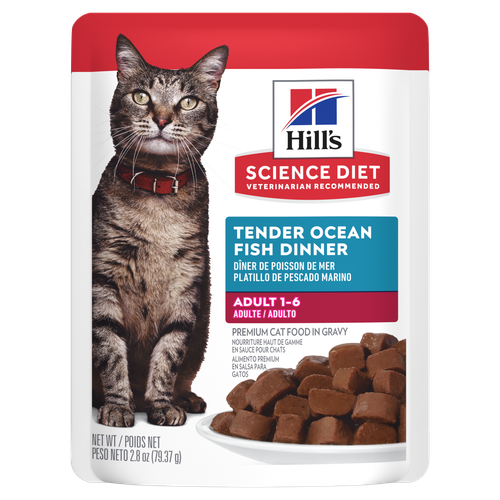
-
Find the right food for your petTake this quiz to see which food may be the best for your furry friend.Find the right food for your petTake this quiz to see which food may be the best for your furry friend.Featured products
 Adult Perfect Weight & Joint Support Hearty Vegetables and Tuna Stew Dog FoodShop Now
Adult Perfect Weight & Joint Support Hearty Vegetables and Tuna Stew Dog FoodShop Now Healthy Cuisine, Adulte, assortiment de conserves
Healthy Cuisine, Adulte, assortiment de conservesHill's Science Diet Healthy Cuisine Variety Pack
Shop Now Sensitive Stomach & Skin, assortiment de conserves
Sensitive Stomach & Skin, assortiment de conservesHill's Science Diet Sensitive Stomach & Skin Variety Pack
Shop NowFeatured products Perfect Weight Salmon & Vegetable Canned Cat Food
Perfect Weight Salmon & Vegetable Canned Cat FoodOver 70% of cats lost weight within 10 weeks when fed this nutrition
Shop Now Adult Chicken & Spinach Casserole Cat Food
Adult Chicken & Spinach Casserole Cat FoodWith delicious chunks in a decadent gravy
Shop Now Adult 7+ Tender Chicken Dinner Cat Food
Adult 7+ Tender Chicken Dinner Cat FoodWith delicious chunks in a decadent gravy
Shop Now -
Dog
- Dog Tips & Articles
-
Health Category
- Weight
- Food & Environmental Sensitivities
- Urinary
- Digestive
- Joint
- Kidney
- Dental
- Cancer
-
Life Stage
- Puppy Nutrition
- Adult Nutrition
- Senior Nutrition
Cat- Cat Tips & Articles
-
Health Category
- Weight
- Skin & Food Sensitivities
- Urinary
- Digestive
- Kidney
- Dental
- Stress
- Cancer
-
Life Stage
- Kitten Nutrition
- Adult Nutrition
Featured articles Compare Your Pet Food's Calories to Other Brands
Compare Your Pet Food's Calories to Other BrandsCompare Hill's Science Diet dog and cat food's calories against other pet food brands and AAFCO recommended maximum calorie count.
Read More Pet Food Storage Tips
Pet Food Storage TipsDiscover how and where to store your dry, as well as canned, dog and cat food. Learn how to find the "best before" dates on all Hill's pet food packaging.
Read More The Incredible Science Behind Your Pet's Microbiome
The Incredible Science Behind Your Pet's MicrobiomeLearn what a pet's microbiome is, how it contributes to your pet's gut & overall health, and why nutrition is important in maintaining healthy microbiomes.
Read More -


When you visit your veterinarian, be sure to bring up any questions or concerns regarding your cat's health. To help you determine abnormalities you need to discuss with your veterinarian, please review the following lists.
What's Normal
- Eyes: Should be bright and clear. Report any discharge to your veterinarian.
- Ears: Should be clean and free of discharge, odor and redness. Untreated ear problems are painful and can cause hearing loss.
- Mouth: Should smell fresh. Gums should be pink. Teeth should be free of tartar or plaque. Mouth and lips should be free of sores or growths.
- Coat: Should be shiny and clean.
- Weight: Active cats are rarely overweight. Ask your veterinarian for advice on providing the right cat food to maintain your cat's healthy weight.
- Litter Box Habits: Report changes in litter box habits such as frequency or consistency of your cat's urine or stool to your veterinarian immediately.
What's NOT Normal


Tasty Tips
- Diarrhea: This common ailment can be caused by many factors including bacteria, viruses, internal parasites, toxic substances, too much food or psychological upsets. Call your veterinarian if stools are bloody, if there is a large volume of watery stools, if your cat is thin or potbellied, or if the diarrhea continues for more than 24 hours.
- Constipation: Like diarrhea, constipation can be caused by many factors, including ingesting substances such as hair, bones or foreign materials, or because of disease or insufficient water intake. Your veterinarian may recommend blood tests, radiographs or perform other tests to find the cause.
- Vomiting: It is not uncommon for a cat to vomit occasionally, but frequent or persistent vomiting is not normal. Call your veterinarian if vomiting occurs more than five times in a few hours, large volumes are vomited, vomit contains blood, or is accompanied by diarrhea or abdominal pain.
- Abnormal Urination: Straining to urinate or bloody urine may indicate a painful infection of the urinary tract. Contact your ,veterinarian immediately.


One of our staff authors prepared this article for you
Related products

With delicious chunks in a decadent gravy

With delicious chunks in a decadent gravy

With delicious chunks in a decadent gravy

Over 70% of cats lost weight within 10 weeks when fed this nutrition
Related articles

Discover how to identify cat sensitive skin and what you can do to help your cat thrive from head to paw.

Discover the benefits of Hill's line of kitten foods and how they provide complete and balance nutrition for growing kittens.

What is the best food for an overweight cat? Learn all about weight control food for cats, including what's in it and how it works.

When you adopt a cat, you don't just gain a best friend; you also save her life. Here's why getting a cat from a local animal shelter makes so much sense.

Put your cat on a diet without them knowing
Our low calorie formula helps you control your cat's weight. It's packed with high-quality protein for building lean muscles, and made with purposeful ingredients for a flavorful, nutritious meal. Clinically proven antioxidants, Vitamin C+E, help promote a healthy immune system.
Put your cat on a diet without them knowing
Our low calorie formula helps you control your cat's weight. It's packed with high-quality protein for building lean muscles, and made with purposeful ingredients for a flavorful, nutritious meal. Clinically proven antioxidants, Vitamin C+E, help promote a healthy immune system.

